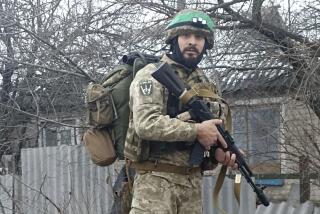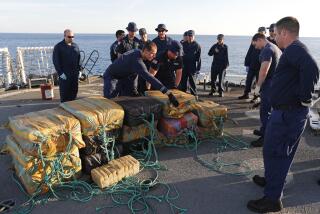70 Long-Held Troops Freed by Colombia Rebels
CARTAGENA DEL CHAIRA, Colombia — Leftist guerrillas ended one of the most humiliating chapters in Colombia’s military history Sunday with the release of 70 soldiers and marines they had held prisoner for as long as nine months.
The guerrillas treated the release as a public relations coup, inviting a dozen ambassadors and other foreign notables to a ceremony that began with the national anthem and featured a rare appearance by Joaquin Gomez, the 43-year-old bespectacled commander of the southern bloc of the Revolutionary Armed Forces of Colombia, the country’s oldest and largest insurgent movement.
“Being in this situation has humiliated us,” Jhonatan Bustamante, a captured soldier, told reporters at a guerrilla-run news conference shortly before being freed.
The release followed negotiations between the government and the insurgents that came after the military failed in its efforts to find--much less rescue--the captured troops. To secure the troops’ freedom, the military agreed to withdraw from a 4,700-square-mile cocaine-producing area for a month. The guerrillas have strong links to the cocaine trade.
The capture and release highlighted military weaknesses that in three decades of civil war have allowed guerrillas to take control of half the country. Now, both security experts and residents of guerrilla-held zones worry that the armed forces will take revenge by waging a “dirty war” against suspected guerrilla supporters.
“This was more the result of military errors than the success of the guerrillas,” said Eduardo Pizarro, a political analyst at the National University in the capital, Bogota. “This was a humiliation for the armed forces, a humiliation that went on for months.”
Sixty soldiers were captured Aug. 30, when guerrillas overran a military base near here. Ten marines were taken prisoner during a firefight near the Panamanian border in January.
“They have demonstrated the capacity to maintain a relatively large number of prisoners,” said Armando Borrero, a former national security advisor. “They have projected the image that they are a combat force that deserves treatment beyond that afforded some guerrillas hidden in the mountains.”
From a practical viewpoint, the negotiated release gives the insurgents--at least temporarily--control of one of Colombia’s most important growing regions for coca, the leaf used to produce cocaine. The army had fought hard for two years to choke off cocaine trafficking in the region by closely controlling shipments of cement and gasoline, which are used to process the leaves into cocaine.
Links to the cocaine trade have provided Colombia’s 12,000 guerrillas with both an income and a strong popular base among coca growers. For example, in this steamy jungle community, reachable only by river, coca is the only viable commercial crop. Everything else spoils in the heat before it can get to market.
Support for the guerrillas is so strong in this region that the mother of one freed soldier told reporters, “At least the guerrillas respect people more than the military.”
The armed forces’ abysmal human rights record has made farmers loath to provide soldiers with information that would allow them to effectively fight the guerrillas, analysts said.
“Colombia’s army has a seriously deficient intelligence service,” said political analyst Alejandro Reyes. “Intelligence often boils down to extorting, mistreating or torturing captives into giving information.”
More than 70% of Colombian soldiers are poorly paid recruits, like those released Sunday. Many are armed with old German rifles, while the six rebels at a roadblock near here carried Chinese AK-47s and Israeli-made assault rifles.
Analysts also criticize tactics that have left a quarter of the country’s troops guarding oil installations, with many of the remainder stuck at outposts. “Colombia’s forces are organized so that they can’t move with the agility necessary for fighting guerrillas,” said Carlos Franco, a former insurgent turned politician.
Army commander Gen. Manuel Jose Bonnett countered that criticisms of the army are simply insurgent propaganda. “The result is permanent condemnations, threats from the United States to eliminate our military aid and restrictions on visits by our officers to other nations,” he said.
Nevertheless, perceptions of army abuses are widespread, both inside and outside Colombia.
“Now that the [guerrillas have] effectively won a political victory here,” said Ruben Dario Pardo, a social worker at the local church, “we are afraid that there will be reprisals that will wipe us all out.”
Times staff writer Darling reported from Bogota and special correspondent Ambrus from Cartagena del Chaira.
More to Read
Sign up for Essential California
The most important California stories and recommendations in your inbox every morning.
You may occasionally receive promotional content from the Los Angeles Times.










